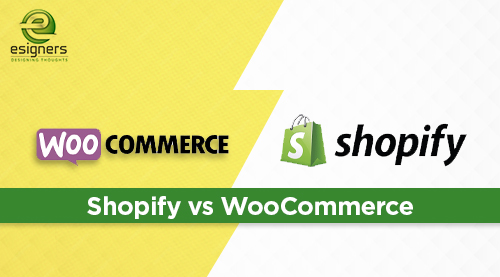Blog
Shopify vs. WooCommerce: Platforms Comparison

October 18th, 2024 by esigners
WooCommerce and Shopify are the two leading e-commerce platforms and as such both of them offer you a wide range of features as far as setting up online stores and managing them are concerned. Shopify is a hosted solution that provides you with a complete package including all the technical work that needs to be done to run your e-commerce store. This includes hosting, payment processing and website design. On the other hand, WooCommerce is a self-hosted plugin that has been created for WordPress. Here it would help if you had a domain name and a hosting account, and you have to manage your store online as well.
Comparison in terms of setting up your online store
Shopify provides you with a user-friendly interface and lets you set up the online store quickly as well. Once you have enrolled for an account you can access the dashboard for an easy setup guide and customizing your store. Starting an e-commerce store on WooCommerce means taking a few more steps than you would have to if you use Shopify for the same purpose. First of all, you would have to buy web hosting facilities, and then install the platform for free, and choose extensions along with a premium theme.
Comparison in terms of themes and customization capabilities
If you use WooCommerce you can access thousands of themes that are available on the WordPress platform which means that you have a commendable array of design options that can be fitted into the needs of an e-commerce store. On the other hand, Shopify offers you at least 100 options including premium themes. Both these platforms provide you with plenty of scope for customizing your e-commerce store. However, it is a bit better on WooCommerce because it is an open-source platform that offers you more flexibility in this context.
Comparison in terms of processing payments
Shopify charges extra fees for using external payment gateways on the other hand WooCommerce does not charge any extra fee for using such gateways. This means that you would have to pay only the transaction fee that your selected gateway or bank charges for the transaction. This difference in transaction fees tends to be a factor for a lot of e-commerce store owners. If you want to use a certain gateway only and do not want to pay any fee for it, WooCommerce is the better choice.
Comparison in terms of sales and marketing tools
Both WooCommerce and Shopify offer you several tools that you can use to promote your products. On Shopify, you get features like discount codes and email campaign applications that help you stimulate sales. WooCommerce also offers you plugins such as Smart Coupons that you can use to create customized offers for specific customer segments. This, in turn, helps you reactive dormant customers and draw in new ones. However, these platforms differ in terms of the features that they offer you to enhance your sales.
Comparison in terms of e-commerce store optimization
Both these platforms come with in-built SEO (Search Engine Optimization) features. From Shopify, you get primary-level SEO support like site copy and meta information. On the contrary, WooCommerce has strong SEO tools like the ability to change on-page elements like body content, meta descriptions, URLs (universal resource locators), and alt tags. WooCommerce employs WordPress plugins to provide you with the best SEO which implies you get to access well-known SEO plugins such as The SEO Framework and Yoast SEO. The choice of such plugins on the app store of Shopify is limited in comparison though.
Comparison in terms of inventory management
Both these platforms offer you the scope to manage your inventory in terms of product variants and organize your stock. The inventory management features on Shopify let you monitor your inventory levels for products and variants and also link them to your inventory items. On the contrary, WooCommerce lets you configure variations for every product. WooCommerce is however better than Shopify in terms of the options it offers in terms of scalability. This is because it is more flexible and can deal well with abrupt increases in traffic as well as the addition of new products and pages.
Comparison in terms of security standards
Both these platforms are capable of ensuring that users can transact safely. Shopify offers in-built security features like 3D (three-dimensional) secure authentication, account security best practices, and secure payment options. WooCommerce needs extra measures so that you can maintain a safe online presence such as selecting a secure host, adhering to PCI-DSS (Payment Card Industry Data Security Standard) compliance, installing an SSL (Secure Sockets Layer) certificate, and putting into practice safety measures like specialized plugins and monitoring. Shopify also offers in-built security features to make sure your store stays safe from cyber-attacks, hacking attempts, and malware infections.
Comparison in terms of other key areas
The pricing plans of Shopify are transparent while in the case of WooCommerce, the costs depend on factors such as hosting, plugins, and themes. WooCommerce is not as good as Shopify when it comes to customer support. It depends more on professional assistance and community forums. The experience in Shopify is a lot better for the users while WooCommerce offers more in terms of flexibility and options for customization.
In the end, it can be stated that both WooCommerce and Shopify are immensely strong e-commerce platforms with their unique capabilities and features. Shopify offers you a hosted solution that is more user-friendly and has support and built-in security features. On the other hand, on WooCommerce you get more flexibility and options for customization thanks to it being an open-source platform. It also lets you access the extensive library of plugins at the disposal of WordPress. Ultimately, the one you choose from among them depends on your specific needs, business goals, and preferences.
